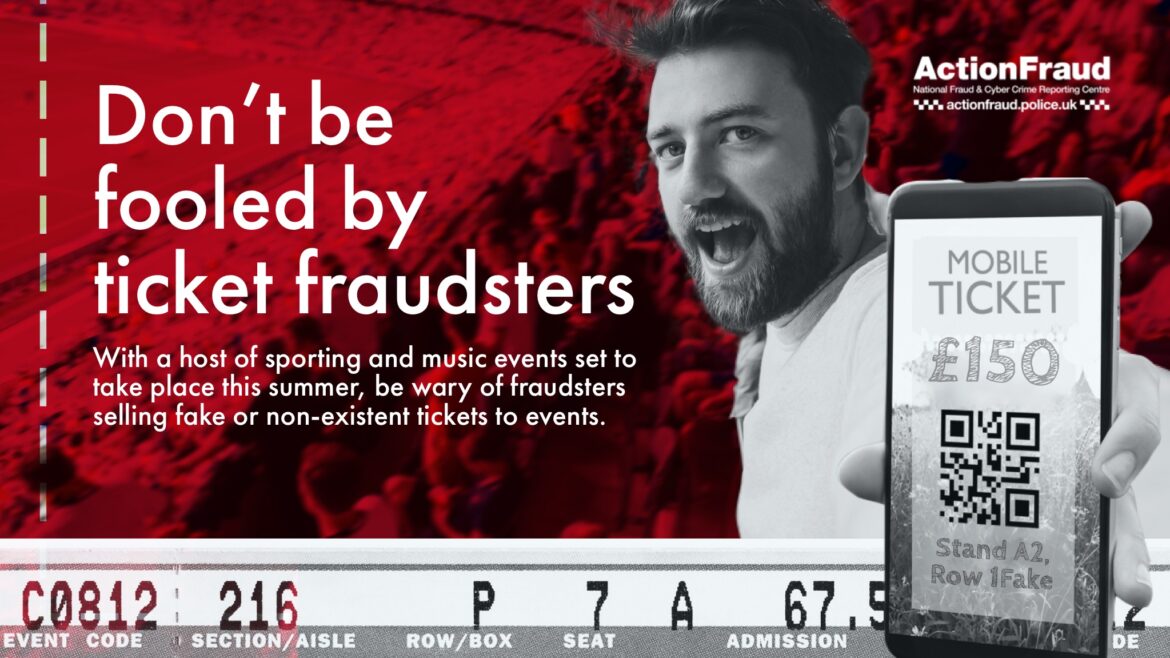 The PSNI is urging people to be wary of scammers when booking tickets for concerts and other events as figures show almost £300,000 was lost to ticket fraud last year in the North of Ireland.
The PSNI is urging people to be wary of scammers when booking tickets for concerts and other events as figures show almost £300,000 was lost to ticket fraud last year in the North of Ireland.
Data from Action Fraud shows nationally £6.7 million was lost to this type of crime. In Northern Ireland, the total reported losses came in at £291,344.36 with 299 reports made.
Chair of ScamwiseNI Partnership, Chief Superintendent Gerard Pollock says not only does this fraud leave people out of pocket financially, but will also leave them left outside at the doors of concert venues.
“We’ve had reports of people buying tickets through social media platforms, thinking they’re getting the real deal only to find out the money they’ve shelled out is to someone who isn’t genuine, and the tickets they’ve paid hundreds of pounds for never existed in the first place,” says Chief Superintendent Pollock.
“With some big names on tour this summer, demand is always high for those concerts which have, in reality, been sold out months in advance. Avid fans are being exploited, often by organised criminals, in the hope of seeing their heroes live.”
Ticket fraud often involves the use of images and graphics taken from genuine sellers to make fake websites look like the real deal, or use contact through social media.
The advertisement or offer may appear genuine, but there will be subtle differences buyers should look closely at, such as the website address.
A recent example includes a report of a person who thought they’d bought Taylor Swift tickets for £400 via an online ‘Buy and Sell’ page.
The person was then asked to pay a further sum of money for a change of name, which they did. Once all the money was transferred, the buyer was blocked by the seller.
The tickets never arrived and the person was swindled out of their money. The exact same happened to another person last month who paid over £600 for what they thought were Taylor Swift tickets.
With summer gigs and events fast approaching, Chief Superintendent Pollock says people should only buy tickets from legitimate, authorised ticket sellers and resellers as criminals will exploit the eagerness by fans to get their hands on tickets for a show or gig they really want to go to.
“I would also urge parents buying tickets for children and young adults going to a concert, and those who make a last-minute decision to go to a concert, to be really cautious when buying your ticket.
“Too often, we see reports of tickets that don’t materialise at all, or are just screenshots of genuine tickets that won’t get you any farther than the ticket barrier,” says Chief Superintendent Pollock.
“The safest way to ensure tickets bought are genuine is to purchase them from the authorised ticket seller or authorised re-seller.
“We’d also advise against buying tickets from other sources, such as third parties because you can never be sure of the validity and authenticity of the tickets.
“When purchasing a ticket from a reseller you should also check the re-sale or transfer policy for that concert, often there are strict policies regarding how tickets can be sold or transferred, breaching these can mean your ticket is invalid.
“Similarly, some events require the person booking the tickets to attend the event, so it’s always important to check the fine print of the event itself.
“Ticket fraud is a continuing problem and fraudsters will try everything to lure people into falling for their scams. It is vital people take care when buying tickets.
“Follow our Stop. Check. Report. advice and recognise the signs of ticket fraud before getting caught out and remember, if it seems too good to be true, it probably is.”
If you lose money in a ticket fraud, report it to your bank and to Action Fraud on www.actionfraud.police.uk or call police on 101. You can also find out more on our website at http://www.psni.police.uk/ticket-fraud
How to spot scam ticket websites:
STOP – Whilst it’s always tempting to rush in and buy those hot tickets, don’t rush into buying a ticket. Do not transfer money by bank transfer and only pay by a protect payment method.
CHECK – Check the website or re-seller you are buying from before you buy. Check the events ticket re-sale policy to make sure tickets re-sold remain valid, or if there is a designated resale agent, or specific policies for this event or venue. Check the venue or the event website. If you have bought a ticket, and you are concerned about the validity of it, check with the event on its validity.
REPORT – If you lose money in a ticket fraud, don’t just shake it off, report it to police at www.psni.police.uk/report or to your bank. You can also report to Action Fraud on www.actionfraud.police.uk or by calling police on 101. Further information is available at www.psni.police.uk/ticket-fraud
Tags:





